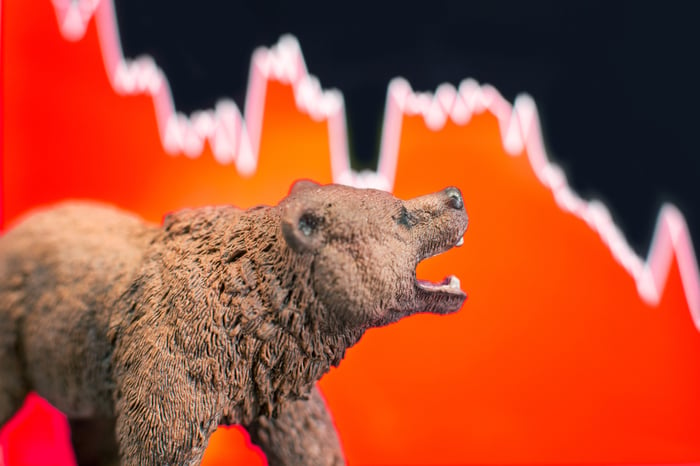It's been a wild two years for Wall Street. After rocketing to record-closing highs in 2021, all three major stock indexes stumbled into a bear market last year. The innovation-focused Nasdaq Composite (^IXIC 2.02%) was hardest hit, with the index shedding a third of its value.
However, downturns are a funny thing on Wall Street. Even though we'll never know in advance when corrections or bear markets will begin, how long they'll last, or much they'll ultimately decline, history shows without a shadow of a doubt that all downturns are eventually wiped clean by a bull market rally -- even in the Nasdaq Composite. In other words, patience continually pays off.

Image source: Getty Images.
Considering that growth stocks were pummeled during the 2022 bear market, starting your research with fast-paced businesses can be a smart move. Even with the Nasdaq Composite bouncing significantly off of its 2022 bear market lows, bargains can still be found.
What follows are four unparalleled growth stocks you'll regret not buying in the wake of the Nasdaq bear market dip.
Visa
The first unique growth stock that still represents a bargain following the 2022 Nasdaq bear market is payment processor Visa (V -0.23%). Though there are concerns that Visa could be hurt by a U.S. recession, the company's well-defined competitive advantages place it in a class of its own within the financial sector.
To address the obvious, Visa is a cyclical business. If an economic downturn does materialize, there's a good likelihood that consumer and enterprise spending will slow. But there's a key difference between economic expansions and recessions. Whereas the latter has lasted between two and 18 months after World War II, expansions are almost always measured in multiple years. This means Visa spends very little time navigating a challenging environment and most of its time in the proverbial sun.
Among the United States' four major payment processors, none gained more market share after the Great Recession ended in 2009 than Visa. As of 2021, annual filings show that Visa accounted for 52.6% of credit card network purchase volume in the U.S., the top market for consumption worldwide. The nearly 29-percentage-point lead it holds over Mastercard, the No. 2 payment processor in the U.S., appears insurmountable.
But this is an international growth story, too. Visa has been able to use its deep pockets to inorganically move into new markets, such as with its acquisition of Visa Europe in 2016. However, it has ample cash flow to organically introduce its payment infrastructure into chronically underbanked regions, such as the Middle East, Africa, and Southeastern Asia.
AstraZeneca
A second unparalleled growth stock that's begging to be bought in the wake of the Nasdaq bear market drop is pharmaceutical stock AstraZeneca (AZN 0.19%). Although AstraZeneca's mid-single-digit sales growth may not meet the traditional definition of "growth," Wall Street's consensus that calls for a better than 13% annualized earnings growth rate over the next five years certainly qualifies it as a growth stock among big pharma.
What's allowed AstraZeneca to really stand out after decades of underperformance is two of its core areas of focus: oncology and cardiovascular. Excluding currency movements, AstraZeneca recorded 19% and 22% respective year-over-year sales growth from its oncology and cardiovascular segments in the first quarter, which continues a multiyear streak of double-digit sales growth for these indications. Thanks to non-Hodgkin's lymphoma drug Calquence, AstraZeneca now has four blockbuster cancer drugs.
In addition to successfully building out its novel-drug pipeline and product portfolio, AstraZeneca deserves credit for its incredibly smart acquisition of rare-disease drugmaker Alexion Pharmaceuticals, which closed in July 2021. Despite there being plenty of hurdles in targeting a small pool of prospective patients, rare-disease therapeutics that are successful in clinical studies usually face limited or no competition and virtually no pushback from insurance companies on their high list prices.
To add to the above, Alexion developed a next-generation drug (Ultomiris) to eventually take the place of blockbuster Soliris, which was responsible for more than $4 billion in annual sales at its peak. Developing a Soliris replacement ensures that AstraZeneca's rare-disease cash flow is protected for a long time to come.

Image source: Getty Images.
Sea Limited
The third one-of-a-kind growth stock that you'll regret not scooping up in the wake of the Nasdaq bear market swoon is Singapore-based conglomerate Sea Limited (SE 0.05%). Even though Sea's valuation premium has, on occasion, been an eyesore, the company appears to have made tangible progress with regard to its operating efficiency and profitability.
What makes Sea Limited one of a kind is its three separate operating segments: digital entertainment, digital financial services, and e-commerce. The company's digital entertainment segment, known as Garena, is probably the "weakest" at the moment. With the worst of the COVID-19 pandemic now (hopefully) in the rearview mirror, we're seeing consumers spend less time gaming and more time enjoying things outside of their homes. Yet even with a decline in bookings and quarterly active users, the percentage of users paying to play (7.7%) is considerably higher than the digital gaming industry average.
Meanwhile, the company's fintech solutions segment is its smallest but fastest-growing -- Q1 sales surged by 75% from the comparable quarter in 2022. Many of the countries Sea operates in are underbanked, including most of Southeastern Asia. Providing digital mobile wallets and access to loans is a potential game-changer for these rapidly growing emerging markets.
But the operating segment that's really making waves is e-commerce platform Shopee. Thanks to strong user growth and mindful cost reductions, Shopee delivered nearly $208 million in adjusted earnings before interest, taxes, depreciation, and amortization (EBITDA) in Q1 after reporting an adjusted EBITDA loss of almost $743 million in the comparable quarter in 2022. Shopee is Sea's core sales driver and should, eventually, account for the bulk of its operating cash flow.
Teladoc Health
A fourth unparalleled growth stock you'll regret not buying in the wake of the Nasdaq bear market dip is leading telemedicine player Teladoc Health (TDOC -2.40%). Despite Teladoc reporting three mammoth losses last year that were tied to its, in hindsight, grossly overpriced acquisition of applied health signals company Livongo Health, the company offers clear-cut advantages that patient investors will come to appreciate.
To begin with, Teladoc is altering (for the better) how personalized care is administered. Though not all patient-physician consultations can be conducted virtually, Teladoc is providing a platform that can make visits more convenient for patients while allowing physicians to keep closer tabs on their patients with chronic illnesses. For insurers, the end result should be improved patient outcomes and less money out of their pockets.
Livongo Health is another interesting aspect of Teladoc Health's growth model that's not being given enough credit. Putting aside the fact that Teladoc overpaid for Livongo, we witnessed chronic-care memberships hit nearly 1.03 million during the March-ended quarter (up 13% year over year). Livongo's health solutions target sizable pools of people with common chronic-care conditions, such as diabetes, hypertension, and weight management. We're likely witnessing just the tip of the iceberg for the combined company's chronic-care potential.
The other factor to consider is that healthcare stocks are well protected in the event of an economic downturn. As much as we'd like to simply not get sick when it's financially inconvenient to do so, we don't have that freedom. Demand for prescription drugs, medical devices, and healthcare services tends to be consistent in any economic environment. Since Teladoc's virtual visits are often cheaper than in-person visits, a strong case can be made for ongoing platform adoption.





